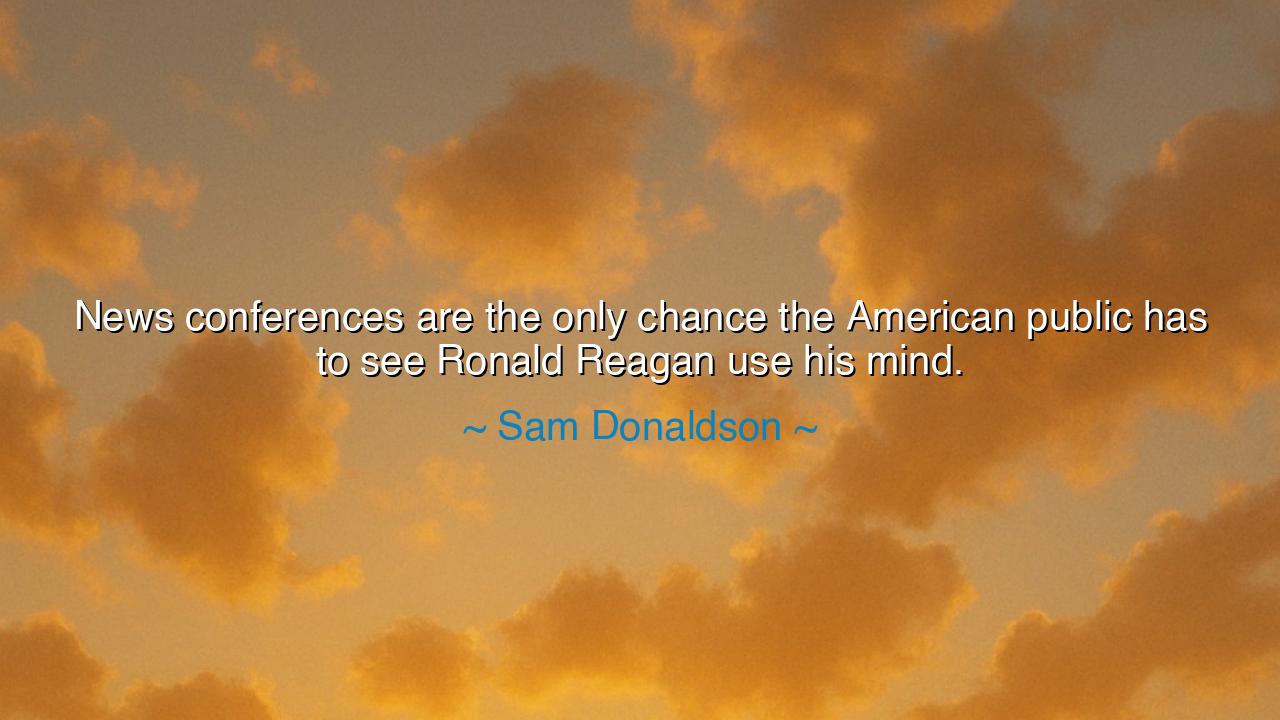
News conferences are the only chance the American public has to
News conferences are the only chance the American public has to see Ronald Reagan use his mind.






In the grand theater of politics, where leaders stand before the world, their words and actions are scrutinized, there lies a profound truth about the nature of communication and power. Sam Donaldson, a seasoned journalist, once remarked, "News conferences are the only chance the American public has to see Ronald Reagan use his mind." With these words, Donaldson strikes at the heart of an uncomfortable reality—the public persona of a leader is not always an accurate reflection of their intellectual capacity or their true capabilities. This statement, though directed at Reagan, speaks to a broader truth about leadership: that visibility does not always equate to substance, and the public's understanding of its leaders is often shaped not by their inner lives, but by the curated images they present.
The ancients, too, understood the power of image and representation in leadership. In the writings of Plato, the philosopher critiqued the way in which those in positions of power could manipulate their public image, often obscuring the truth of their actions. Plato’s Republic describes how rulers, called philosopher-kings, should be chosen not by their ability to appear wise, but by their actual wisdom. The image of a king or leader can often be a facade, an ideal crafted by the society, designed to mask the limitations or imperfections of the ruler. In this, Donaldson’s words echo the ancient call for authenticity in leadership. To be seen is not enough; a leader must be truly capable and should demonstrate their intellect and wisdom, not merely in appearance, but in action.
Consider the story of Alexander the Great, who, though surrounded by the mythic grandeur of his conquests, was also a man of intellect. His actions, his strategies, were often guided by a deep understanding of history, philosophy, and military science. But Alexander knew that the true power of his leadership lay not in how others perceived him, but in how well he could think, plan, and decide in the moment. When he faced the Persians at Gaugamela, it was not brute force alone that led him to victory, but his ability to adapt, to strategize, and to lead with foresight and intellect. Alexander’s greatness lay not in his image as a conqueror, but in his mind and his ability to use it effectively, much as Donaldson wishes the American public could witness from Reagan.
Ronald Reagan, of course, was not a stranger to public scrutiny. He was often lauded for his charisma, his ability to inspire, and his carefully crafted speeches. Yet, as Donaldson’s critique suggests, the moments when the mask of the political image slipped away—such as during news conferences—were when the true measure of Reagan’s mind and capacity for critical thinking were laid bare. The public persona of Reagan, the optimistic, genial leader, often overshadowed the more complex and nuanced challenges he faced. What Donaldson observed was that moments of true reflection and intellectual engagement were rare, and when they occurred, they were often lost in the haze of public relations and political theater.
This brings us to the lesson that can be drawn from Donaldson’s statement: leadership is not simply about visibility or charisma, but about substance. The most effective leaders are those who are willing to engage their minds, to think critically and openly, and to show their true intellectual strength when the moment demands it. Much like Socrates in ancient Athens, who challenged the status quo not with force but with intellect, the true power of a leader lies in their ability to think deeply, to reflect on their actions, and to lead with wisdom. The test of a leader is not in their ability to project an image of greatness, but in their willingness to reveal their true thoughts and reasoning in moments of public scrutiny.
In your own life, reflect on how you present yourself to the world. Are you more focused on the image you project, or do you invest in cultivating the substance that lies beneath the surface? Just as Donaldson pointed out the need for Reagan to engage his mind in public moments, we too are called to engage our minds in every action we take. Whether you are a leader, a worker, or a creator, your true power lies in your ability to think critically, to reflect deeply, and to act with integrity and authenticity. Seek not to impress others with the facade of your success, but with the substance of your wisdom and the depth of your thought.
Let Donaldson’s words serve as a reminder: true leadership is not about the image we project but about the strength of our minds and the authenticity of our actions. In the age of curated identities and public personas, the value of substance—of genuine intellect and critical engagement—cannot be overstated. Whether in public life or in private moments, let us all strive to show more than our image—let us show our minds, our depth, and our willingness to lead with both heart and intellect.






AAdministratorAdministrator
Welcome, honored guests. Please leave a comment, we will respond soon